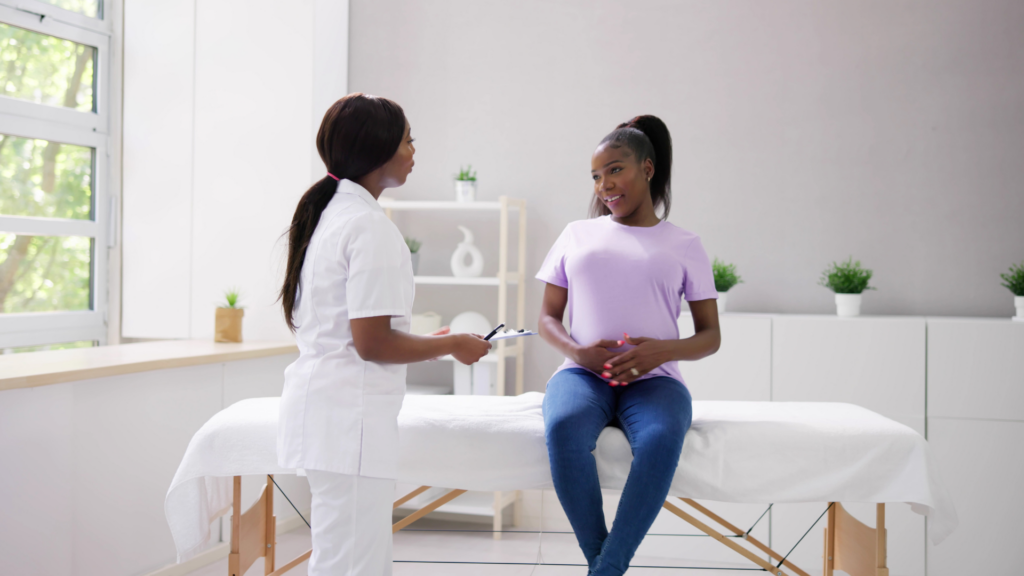In today’s fast-paced world, health often takes a backseat, especially among younger generations. However, regular gynecological check-ups for young black women are so important for maintaining overall well-being and proactively addressing potential health concerns. These appointments are not just routine; they are life-saving. This article will put into perspective the significance of early detection, the unique health challenges faced by Black women, and why consistent gynecological care is indispensable.
The Unique Health Challenges Faced by Black Women

Black women are statistically more prone to certain health conditions, including fibroids, endometriosis, and cervical cancer. These conditions, however, frequently go undiagnosed until the condition is noticeable. Regular gynecological check-ups are essential for early detection and proactive management of these issues among Black women. By scheduling routine exams, Black women can ensure that any potential problems are caught and addressed in a timely manner, leading to better health outcomes and a higher quality of life.
Socioeconomic factors also play a significant role in health disparities as well. Limited access to quality healthcare, financial constraints, and lack of awareness contribute to the delayed diagnosis and treatment of gynecological issues in Black women.
Many Black women face significant barriers to accessing comprehensive and affordable healthcare. They may live in underserved communities with limited options for gynecological care providers, or their health insurance coverage may be inadequate, making routine check-ups and necessary treatments financially inaccessible.

The Role of Regular Gynecological Check-ups
Regular gynecological check-ups facilitate early detection of potential health issues. Early diagnosis can lead to more effective treatment and better outcomes. For instance, routine Pap smears can detect cervical cancer at an early, more treatable stage.
These appointments are not limited to reproductive health. Additionally, Gynecologists also monitor overall health, including blood pressure, cholesterol levels, and diabetes, which are prevalent among Black women. Regular check-ups allow for:
- Early detection of hypertension, which disproportionately affects Black women
- Screening for diabetes and prediabetes, conditions that can impact reproductive health
- Monitoring of weight and body mass index (BMI), as obesity can increase risks for various gynecological issues
- Assessment of thyroid function, which can affect menstrual cycles and fertility
- Evaluation of bone density to prevent osteoporosis
- Breast examinations and referrals for mammograms when appropriate
- Discussion of lifestyle factors that may impact overall and reproductive health
Gynecologists provide personalized advice on contraception, sexual health, and family planning. This guidance is crucial for young women navigating their reproductive health. Personalized advice may include:
- Tailored contraceptive options based on individual health history, lifestyle, and preferences
- Education on sexually transmitted infections (STIs) and prevention methods
- Discussions about fertility and family planning options
- Guidance on menstrual health and management of conditions like PCOS or endometriosis
- Information on sexual health and addressing any concerns or questions
- Advice on maintaining vaginal health and preventing infections
- Counseling on relationships and sexual well-being
- Discussion of mental health as it relates to reproductive and sexual health
- Guidance on nutrition and exercise for optimal reproductive health
- Information on genetic screening and counseling when relevant

Overcoming Barriers to Regular Check-ups
Education and Awareness
The lack of educational resources and culturally competent healthcare information has lead to a limited understanding of the importance of regular gynecological check-ups for young Black Women. There are symptoms to be aware of, and the necessity of proactive management of conditions like fibroids, endometriosis, and cervical cancer. Raising awareness about the importance of regular gynecological check-ups is the first step. Educational campaigns targeting Black women can help dispel myths and encourage proactive health management.
Affordable Healthcare Options
Expanding access to affordable healthcare services is way overdue. Community health centers and mobile clinics can provide accessible and affordable gynecological care. To make this a reality, increased funding and support for these facilities needs to happen. With additional resources, they can expand their reach, hire more staff, and offer a wider range of services, including specialized care for conditions like fibroids and endometriosis.
Many young Black Women are unaware of the resources available to them, so public awareness campaigns, community outreach programs, and partnerships with schools and universities can help spread the word about affordable healthcare options. Advocating for policy changes is one of the best things we can do.
Specifically, pushing for expanded Medicaid eligibility to cover more low-income individuals, requiring insurers to cover essential health benefits including preventive screenings and gynecological care, and working to lower the cost of prescription drugs, especially for chronic conditions.
Collective bargaining power, whether through government programs or patient advocacy groups, can help negotiate lower costs for gynecological procedures and treatments. Supporting medical school scholarships and loan forgiveness programs can incentivize more physicians to practice in underserved communities, increasing access to care for Black women.
Culturally Competent Care

Healthcare providers must offer culturally competent care, understanding the unique challenges faced by Black women. This approach fosters trust and encourages regular check-ups. Diversifying the healthcare workforce is a crucial step. Increasing the number of Black physicians, nurses, and other healthcare professionals can help bridge cultural gaps and improve patient comfort. This requires addressing systemic barriers in medical education and recruitment.
Mandatory cultural sensitivity training for all healthcare providers is essential. This training should cover cultural awareness and sensitivity towards Black women’s experiences, recognizing and addressing implicit bias in healthcare, effective communication strategies that account for cultural differences, and the historical context of medical mistrust in the Black community.
Gynecological Check-Ups for Young Black Women Are Essential
Creating welcoming and inclusive environments in healthcare facilities is also important. This includes providing culturally appropriate reading materials and educational resources, displaying artwork and imagery that reflects the diversity of patients, and hiring staff who are representative of the community served.
Healthcare providers need to prioritize clear, respectful, and empathetic communication. They need to use plain language, actively listen to patients’ concerns and experiences, and involve patients in decision-making about their care. Regular collection and response to feedback from young Black women about their healthcare experiences can drive continuous improvement in culturally competent care.
For Gen Z and Millennial Black women, regular gynecological check-ups are not just a recommendation; they are a necessity. Early detection of health issues, personalized care, and overcoming socioeconomic barriers can significantly improve health outcomes. Prioritizing regular gynecological visits is a crucial step towards a healthier future.
